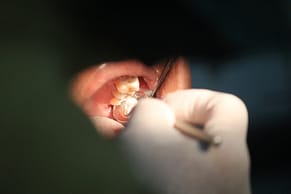As a parent, you know the challenges of ensuring your child’s health and well-being. From ensuring they eat their veggies to getting enough sleep, there’s always something on your plate. But have you given much thought to your little one’s oral health? It may not be at the top of your priority list, but trust us when we say it should be. Parent advice for oral health is plentiful, and we’re here to help you sort through it all. In this blog post, we’ll guide you through some of the most common oral health problems children face. We’ll provide valuable insights and tips on how to prevent and address these issues so that you can keep those precious smiles shining bright.
Cavities
 Cavities, those tiny little troublemakers that can wreak havoc in your child’s mouth. They are the most common oral health problem among children. Poor dental hygiene, sugary snacks, and irregular brushing habits can all contribute to the formation of cavities. But fear not. There are ways to prevent cavities and keep your child’s teeth healthy.
Cavities, those tiny little troublemakers that can wreak havoc in your child’s mouth. They are the most common oral health problem among children. Poor dental hygiene, sugary snacks, and irregular brushing habits can all contribute to the formation of cavities. But fear not. There are ways to prevent cavities and keep your child’s teeth healthy.
First things first, establish a daily routine of brushing their teeth at least twice a day with fluoride toothpaste. Make it fun by choosing a colorful toothbrush or playing their favorite song while they brush.
Gum Disease
Gum disease, also known as periodontal disease, is a common oral health problem that many children face. It occurs when the gums become infected due to the buildup of plaque and tartar on the teeth. If left untreated, gum disease can lead to serious complications and even tooth loss. One of the main causes of gum disease in children is poor oral hygiene. When children do not brush their teeth properly or regularly, bacteria can accumulate in their mouths and cause inflammation in the gums. This can eventually lead to gum disease if not addressed.
Tooth Decay
Tooth decay is one of the most common oral health problems that children face. It is known to occur when bacteria in the mouth produce acids that slowly erode the tooth enamel, leading to cavities. This can be caused by poor oral hygiene habits, such as not brushing and flossing regularly or consuming too many sugary foods and drinks. When tooth decay first starts, it may not cause any noticeable symptoms. However, as it progresses, children may experience tooth sensitivity or pain when eating hot or cold foods. They may also notice dark spots on their teeth or feel a rough texture. Preventing tooth decay is crucial for maintaining good oral health in children.

Tooth Sensitivity
Does your child experience discomfort or pain when they eat something hot, cold, or sweet? If so, they may be dealing with tooth sensitivity. This common oral health problem can make everyday activities like eating and drinking a painful experience for children. Tooth sensitivity occurs when the protective layer of enamel on the teeth starts to wear down. This can happen due to tooth decay, gum disease, or even brushing too aggressively. When the dentin is exposed, it allows hot and cold sensations to reach the nerves inside the tooth more easily. As a result, your child may feel sharp pain or discomfort when consuming foods and drinks that are extreme in temperature.
Being proactive about your child’s oral health will go a long way in preventing these common issues. By teaching good dental hygiene habits at home, scheduling regular dental visits, and watching their diet choices carefully, you’re setting them up for a lifetime of healthy smiles. Remember, as parents, you play a vital role in helping your child develop good oral care habits that will benefit them throughout their lives. We hope that you have found this blog post helpful.…


